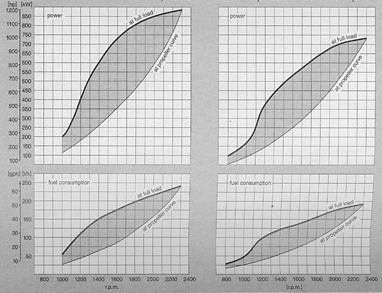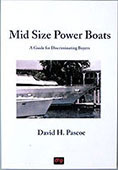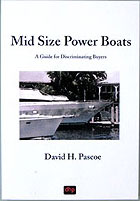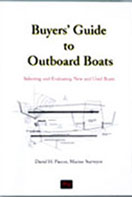Power Options:
Gas -vs- Diesel Part II
by David Pascoe
Judging by the number of letters I get and the questions I see on Internet forums, many people are still quite uncertain about the costs and benefits of gas and diesel engines. "Which is best?" they ask, as if one form of power were universally better than the other.
Introduction
Like most things in life, each type of engine is better suited for some applications than others. It all depends on your needs, the type of boat you own, and how you use it.
Diesel engines are not something you should take lightly. There's a good reason why the rush to put them into cars back in the 1970's flopped. They are not the ideal power source for all applications. The all encompassing, ultimate, operative descriptive adverb that covers diesel engines is the word COST. More about that in a moment.
There is something about diesel engines -- they seem to have a certain mystique about them. I never really felt that way, perhaps because I used to build race car engines, but apparently a lot of people do.
My view is that they are dirty, smelly, noisey and cause a lot of vibration. They're also expensive and there is very little about them that you can repair yourself. Given the choice in most instances, I'd choose gas.
Whether its the deep, throaty growl of a Detroit Diesel, or just a status thing, I really have no idea. But I do know that there's an awful lot of mythology about diesels, much of which simply isn't true.
Basic Principles
In order to clarify the issues somewhat, I'll break them down into separate categories.
Basic Principle #1: In my view, one of the worst things that can happen is to underpower a planing power boat. That's because the engines in a boat that is underpowered are going to be constantly operated at the peak of their power output, meaning that the engines are going to under their maximum load most of the time. That's a prescription for both short engine life and poor fuel economy.
Basic Principle #2: The second worst thing that can happen is to buy engines where the manufacturer has squeezed the maximum available horse power from the engine. The reason is that you end up with the same result as #1 above if that maximum amout of power is needed to run the boat at normal speeds. Running an engine at maximum power greatly reduces service life (often by a factor of four).
Basic Principle #3: Diesel engines are a lousy choice for people who don't use their boats much, or who frequently make only short jaunts. High speed diesel engines should not be run at low speeds for either long or short periods, and then shut down.
The problem here is that diesels build up carbon in the cylinders at low speeds; they need to be run long and hard to burn out that carbon after slow speed running.
If not, then carbon builds up in the ring grooves of the pistons and will eventually cause the rings to stick. When that happens severe, even catestrophic engine damage will result. High speed marine diesels (2000 RPM and over) are not made for idling around.
Basic Principle #4: There is a concerted effort going on by manufacturers to make diesels lighter and less expensive. They are doing this by changing a lot of formerly cast iron parts to aluminum. They tried that 25 years ago, it didn't work then, and I don't believe that it will work now.
Oh, they say they're got all kinds of great new alloys now. Really? Aluminum is still anodic to just about every other metal on a boat, and I see absolutely no reason to believe that these newer engines will fare any better.
Those that tried it and experienced disastrous failures include: Detroit Diesel, Perkins, U.S. Marine, OMC, Volvo, Cummins, Chris Craft and a host of others I can't remember. Caterpillar has wisely stayed away from aluminum, and I would too. If you buy an aluminum diesel, color yourself guinea pig.
The first two principles apply to both gas and diesel engines. The ideal situation is where the boat only requires 80% or less of the engine's maximum power to push the boat at the anticipated cruising speed.
To further understand this, let's take an example. Say we have a 454 cubic inch gas engine which is typically rated at 350 HP, but in this case the engine is in a larger boat and has been bumped up by an engine marinizer to 400 HP.
Now we have a situation in which the engine is not only putting out more power, but is pushing a heavier load. Just as you human body is going to wear out faster if you spend your life doing hard labor, so are those engines.
Not only are they under more strain, but the higher horsepower translates to generating a lot more heat and friction. Each additional increase in horsepower over what the basic engine block was designed to achieve, reduces engine life drastically.
Engine Speed
Diesel engines gained the reputation for long service life early on in the history of the engines, and mainly from engines that were used in commercial operations.
These were big, very slow turning engines, usually in the 600 to 1,000 RPM range. Obviously, not only is an engine running at that speed turning four times slower than an engine at 2400 RPM, but the heat generated and the strain is a great deal less.
Then we hear about how long truck engines last. Well, there's a whole lot of difference between a load that is rolling on wheels and a hull that is pushing tons and tons of water aside. Even though truck diesels turn faster, they have a lot less load on them, so they also last longer, mainly due to continuous operation.
Then there are companies like Stuart-Stephenson who take stock diesel engines and micro tune them by essentially remanufacturing them to extraordinary tolerances, for use in such applications as power generators. These engines can have service lives as long as 60 - 80,000 hours. But that again is because they are operating continuously under constant loads.
The long service life of the diesel is not a myth when used in its proper application; its only a myth in pleasure craft, where engines are operated intermittently, infrequently, at high and low speeds, and usually under very heavy loads and adverse conditions.
Horsepower Vs Torque
Another consideration, which many people find difficult to understand, is the relationship of torque to horsepower. Horsepower alone is not the sole criteria of how powerful an engine is.
Torque is the amount of kinetic energy the engine builds up as a result of the rotating components -- crankshaft, flywheel and pistons. Torque is measured in the number of foot/pounds of power that is required to stop a running engine at differing speeds (In brochures this is often stated as the "power curve").
Most engine manufacturers provide torque/horsepower curves to illustrate the power range. Diesels, being heavier engines, as well as having more power with each stroke of the pistons, develops more torque lower on the torque curve. Gas engines develop their maximum horsepower toward the top of the curve, meaning the greatest power develops at maximum engine speeds, where it is least useable.
Torque is not a constant, but varies over the power curve, as shown in the graphs for a diesel engine below. Notice how there is a steep rise in the curve, and then how it flattens out near the top of the RPM range. Gas engines have curves that are the opposite of diesels, rising gently along the bottom, and then the curve shoots up sharply.
For heavier boats, the best engine is the one that develops its maximum torque lowest on the curve, meaning that the engine is developing more power at lower speeds. Since lower speeds mean less strain, heat and friction, these factors will translate into longer engine life, just as you will probably live longer with a regime of moderate exercise over a life of hard labor.

There is a point in boat size and weight at which gas engines can no longer push the boat efficiently. This is usually around 35-38 feet and 16,000 lbs., depending on hull shape and the amount of hull and wind resistance.
Boats with flatter bottoms require less power, as do low profile boats such as express cruisers as compared to a flybridge fisherman with a tower. For anyone contemplating a purchase in this size range, the ideal choice becomes rather clear. Remember what I said about operating engines on the edge of their power range.
Where Torque is Most Needed
The torque/horsepower curve is most critical for those boats that operate at speeds only slightly above planing speed, e.g. the ones that are operating at the top end of the torque curve.
But wait! Notice that the diesel engine torque curve begins to flatten near the top. That means that for slower boats, at the very point you need the most power, is the point where it begins to fall off. This is precisely the reason that you do not want to buy a boat that is underpowered: you will always be wanting to operate it at the worst possible speed.
The Dilemma
Most questions of choice arise for boats in the 28 to 34 foot range where either type of engine is available with adequate horsepower. Gas engines have the advantage that they are cheap to buy and cheap to repair. Diesels are just the opposite; for the price of one Caterpillar 3208 of comparable power, you could buy three gas engines. For the price of a smaller, in-line 6 cylinder diesel, you could buy two gas engines.
Thus, cost-wise, unless you really need diesel power, they are not very practical. The advantage of the diesel comes only at the point where the extra torque is needed because a gas engine would simply be under too much strain to have an adequate service life.
Fuel Consumption
If you are planning on some serious long range travel, particularly if fuel stops are not available, then fuel consumption becomes and issue. Diesels will typically burn 1/3 to 1/2 the amount of fuel as their gas counterparts. But considering the cost of the engines versus the amount of fuel you will burn during your period of ownership, fuel savings in monetary terms is a non issue.
Cost of Ownership
Initially, the cost of maintaining the new diesel engines is low. The problem arises in that diesels will not tolerate neglect and a lack of maintenance like gas engines will.
Whether you are buying new or used, if you don't follow the maintenance schedule "by the book," then the cost of owning the engines can become very high indeed.
Just so you know where I'm coming from, let me say that I have been performing diesel engine failure analysis for insurance companies for over 25 years now. Having performed countless hundreds of these analysis's, I have a pretty good idea of both why these engines break down, and the cost to repair them. And its not EVER cheap.
First understand that diesel engines develop a tremendous amount of heat and power at lower speeds. Failure to maintain the engine's basic systems results in catastrophic engine damages far more rapidly than gas engines.
For example, gas engines will usually survive common overheating situations, whereas because the higher internal temperatures developed by diesels, overheating can occur very rapidly and more often than not is fatal to the engine.
The older an engine gets, the more prone it is to overheating. That's true of gas engines, but even more true of diesels because the cooling systems are more elaborate, often involving turbo chargers and intercoolers.
Turbochargers utilize the hot exhaust gasses to operate a turbine that forces more air into the engine. This is air that is heated by the exhaust system, and before it enters the engine has to be cooled first, which is the reason for the intercooler. All of this puts more strain on the cooling system and makes it all the more critical that the cooling system be maintained in top condition.
Unfortunately, most boat owners -- I'd venture to say at least 90% of them -- do not understand their engines very well. Moreover, the cost of maintaining the engines, especially when they get 4-5 years old, begins to escalate.
Cooling system overhauls (heat exchanger, oil coolers, fuel coolers and intercoolers) are typically measured in thousands, not hundreds of dollars. That's because you may have as much as a total of 8 coolers to maintain.
This provides the motivation for owners to skimp on maintenance. While performing surveys, I see that most owners won't even change their air intake filters (they are nearly always dirty), so trust me when I say that most boat owners simply run their engines until they quit.
Most boat owners go to great lengths to try to convince me what a wonderful job they do of maintaining their engines. But all I have to do is take one look at the engines to see that its all a Bill Clinton story. If they won't change a hundred dollars worth of air filters, they're sure as heck not going to spend two grand for a cooling system overhaul.
Therein lies the basis for my reticence about recommending diesel engines for small boats. Diesel engines are costly to maintain and my experience shows that most small boat owners are not willing to pay the cost. There are over 100 Marine diesel repair shops in Broward County Florida (Fort Lauderdale) and they're not all there providing routine maintenance.
Mostly they fix engines that go bang. Just check out many of the forums on the web and you will see many owners posing questions about engine problems. They do that because they're trying to find a cheap way out by avoiding having to pay a $70/hr. expert.
Most engines go bang as the result of overheating due to a failure to maintain the cooling system. Cooling systems do not get maintained because (1) owners don't understand how critical it is, and (2) they can't afford to. And that's all there is to it.
Bottom Line
If you have a choice of gas versus diesel, your first criteria should be to determine whether you can really afford to own diesels. The initial price is only part of the cost. If you can't afford to write big checks for routine maintenance, then you're going to be a whole lot better off with gas.
Yes, I'm engaging in some tough talk here but, you know, after hearing these endless excuses for 30 years, one comes to realize that people like to fool themselves when it comes to buying something they can't afford.
Let me tell you about how many V-8 diesel engines that I see with ONE new cylinder head. I see that a lot. Now, why would an engine only need one head? Since they come in pairs, doesn't it make sense that if one is bad, the other won't be long to follow?
Of course it does, but if one head is found to have a problem -- and since the other one doesn't at the moment -- and since its VERY expensive to fix the problem, the owner crosses his fingers and HOPES the other one won't go bad anytime soon. Why would an owner do this? Well, I'll let you answer that question.
Another thing I see are single replacements of exhaust manifolds and risers. Manifolds and risers don't last forever, and they, too, are very expensive, and the engines will have either two or four of them.
Yet its common to see engines with only ONE replaced. Of course the owner doesn't understand that riser or manifold failure can totally wreck the engine by causing water leaks into the cylinders.
Though I'd have to bet that the mechanic who replaced it told him that he could expect the others to fail soon, and that he should replace ALL of them now. Of course, that meant facing up to Big Bill, but the owner took a look at his checking account and decided he couldn't afford it.
These are usually some of the guys who say they owned their boats for 10 years and never spent a penny or had a single problem. If you believe that, I've got some great Asian stocks I'd like to sell you.
Performance Diesels
Harken back to what I said about squeezing the maximum amount of power out of an engine block, along with what I said about cooling systems.
I'm still stunned that I hear guys talking about diesel engines running 3, 4, even 6 thousand hours. I can count the number of engines I've seen with 3000 hours on them that have never been rebuilt on the fingers of one hand.
And virtually every one of them were in slow speed, long range cruisers with superb maintenance. I raised a lot of flack from my previous article in which I stated that the AVERAGE diesel runs about 1000 -1100 hours before overhaul.
I stick by that number, but you have to understand that the AVERAGE includes high performance diesels, as well as those folks who do not maintain their engines at all; the ones who run them until they stop.
High performance diesels cause a tremendous drop the average since the go fast diesels often go bang at 600 hours or less. If anyone would like to challenge that, take a tour of the Fort Lauderdale diesel shops and check out the hour meters on some of these boats. You'll find many of them are less than two years old.
Diesel engines are capable of having a long life when the power to displacement ratio is low. But when they start jacking up the power, beyond what the manufacturer originally intended, that benefit disappears.
There is a very simple formula you can apply to estimate service life: simply multiply the cubic inch displacement of the engine times one. The result is the maximum amount of horse power you can have and still expect a reasonable service life. A 6V92 engine is 552 CID; at powers greater than 550, these engines don't last. At 450, they'll go 10 - 15 years easily.
We recently surveyed a yacht with a pair of 8V71N (naturally aspirated) Detroit Diesels rated at 325 hp that hadn't been overhauled since new 1981. Now, an 8V71 has a 568 cubic inch displacement; the fact that these engines have a 0.56:1 power/displacement ratio explains why they could run so long.
Conversely, divide the CID by the horse power, and the greater the result UNDER the factor of one (1), the longer engine life you can expect. If you have an engine with an 0.70 CID/HP ratio, then you can expect 3000 hours engine life. Otherwise, you are a victim of the myth.
Finally, if you are a novice boater, and even worse, you don't know anything about engines, then you might as well throw darts at brochures as far as making engine choices are concerned.
There's lots of folks out there plunking two hundred or five hundred thou for a nice diesel boat because they figured anyone marketing a product that big or expensive must know what they're doing.
This entire web site is testimony to the fact that many don't. Sure, you probably get a good engine warranty, but it won't warrant you for the builder for putting the wrong engine in a boat.
Take some good advice and get some professional advice before you buy. It can save you from a world of hurt.
Related Article: Power Options : Gas Versas Diesel
Mid Size Power Boats: Chapter 9 Power Options
Posted July 14, 1998
 Visit davidpascoe.com for his power boat books
Visit davidpascoe.com for his power boat books 















David Pascoe is a second generation marine surveyor in his family who began his surveying career at age 16 as an apprentice in 1965 as the era of wooden boats was drawing to a close.
Certified by the National Association of Marine Surveyors in 1972, he has conducted over 5,000 pre purchase surveys in addition to having conducted hundreds of boating accident investigations, including fires, sinkings, hull failures and machinery failure analysis.
Over forty years of knowledge and experience are brought to bear in following books. David Pascoe is the author of:
In addition to readers in the United States, boaters and boat industry professionals worldwide from nearly 80 countries have purchased David Pascoe's books, since introduction of his first book in 2001.
In 2012, David Pascoe has retired from marine surveying business at age 65.
On November 23rd, 2018, David Pascoe has passed away at age 71.
Biography - Long version